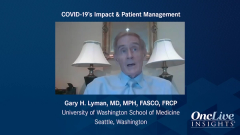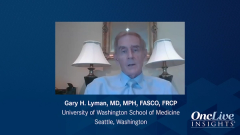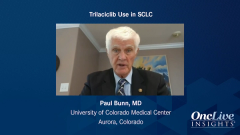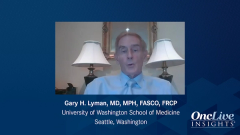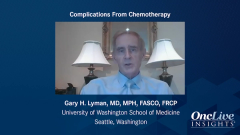
Chemotherapy-Induced Myelosuppression in SCLC: CDK4/6 Inhibition
Episodes in this series

Paul Bunn, MD: Trilaciclib could prevent the effectiveness of chemotherapy. In small cell lung cancer, essentially all of them have Rb [retinoblastoma protein] loss. The tumor cells with Rb loss are not going to be affected by a CDK4 or CDK6 inhibitor. There’s no reason to expect that trilaciclib would reduce the antitumor effect of chemotherapy. In fact, in the 3 clinical trials we’ve been talking about, there’s been no indication that there is any inhibition of the cytotoxic effect of chemotherapy on the tumor. Specifically, response rate and progression-free survival have not been affected, nor has overall survival been affected.
There are some other effects of trilaciclib, which could lead to increased antitumor activity. There’s some indication that trilaciclib has beneficial immune effects, and those have not been evaluated in clinical trials. But in the future, we’ll want to understand the immune effects of trilaciclib better and determine whether it has antitumor properties. For small cell lung cancer, once again, because of the Rb loss, it’s unlikely to make chemotherapy more effective. But if it did stimulate the immune system, that might be beneficial. At present, there’s no evidence of detriment to effective chemotherapy from the addition of trilaciclib, and the trilaciclib adverse effects have been minimal in the clinical trials to date.
There are a couple of questions remaining, of course. One of those questions is cost. Obviously, adding a drug adds cost, but giving intravenous antibiotics in an inpatient setting, visits to the emergency department, red blood cell transfusions, and platelet transfusions have consideration costs. We don’t have any cost analyses comparing the cost of a new drug with prevention. My guess is that it would be cost effective to prevent these, especially if the agent that prevented these things did not have major adverse effects itself and does not interfere with the effectiveness of chemotherapy. That seems to be the case for trilaciclib administration; however, we don’t have good cost-effectiveness studies to date.
We also need more quality-of-life analyses. As I mentioned, fatigue associated with myelosuppression is a major problem for patients. There’s a suggestion that these things may improve quality of life, but we need more data in that regard.
Transcript edited for clarity.



